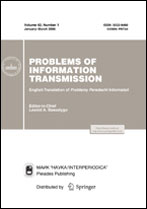|
|
Problemy Peredachi Informatsii, 2014, Volume 50, Issue 2, Pages 31–59
(Mi ppi2138)
|
 |
|
 |
This article is cited in 3 scientific papers (total in 3 papers)
Information Theory
Error exponents for Nakagami-$m$ fading channels
J. Xue, M. Z. I. Sarkar, T. Ratnarajah
Institute for Digital Communications (IDCOM), the University of Edinburgh, Edinburgh, UK
Abstract:
Along with the channel capacity, the error exponent is one of the most important information-theoretic measures of reliability, as it sets ultimate bounds on the performance of communication systems employing codes of finite complexity. In this paper, we derive an exact analytical expression for the random coding error exponent, which provides significant insight regarding the ultimate limits to communications through Nakagami-$m$ fading channels. An important fact about this error exponent is that it determines the behavior of error probability in terms of the transmission rate and the code length that reflects the coding complexity required to achieve a certain level of reliability. Moreover, from the derived analytical expression, we can easily compute the necessary codeword length without extensive Monte-Carlo simulation to achieve a predefined upper bound for error probability at a rate below the channel capacity. We also improve the random coding bound by expurgating bad codewords from the code ensemble, since random coding error exponent is determined by selecting codewords independently according to the input distribution where good and bad codewords contribute equally to the overall average error probability. Finally, we derive exact analytical expressions for the cutoff rate, critical rate, and expurgation rate and verify the analytical expressions via Monte-Carlo simulation.
Received: 12.02.2013
Revised: 27.10.2013
Citation:
J. Xue, M. Z. I. Sarkar, T. Ratnarajah, “Error exponents for Nakagami-$m$ fading channels”, Probl. Peredachi Inf., 50:2 (2014), 31–59; Problems Inform. Transmission, 50:2 (2014), 144–170
Linking options:
https://www.mathnet.ru/eng/ppi2138 https://www.mathnet.ru/eng/ppi/v50/i2/p31
|


| Statistics & downloads: |
| Abstract page: | 269 | | Full-text PDF : | 78 | | References: | 49 | | First page: | 20 |
|





 Contact us:
Contact us: Terms of Use
Terms of Use
 Registration to the website
Registration to the website Logotypes
Logotypes








 Citation in format
Citation in format 
